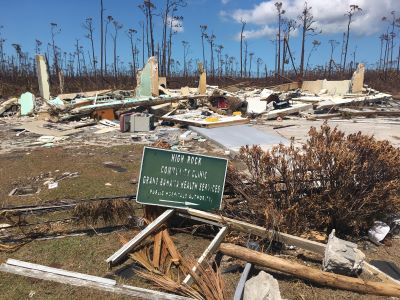Hurricane Responder — Northwestern Nurse and Global Health Student is on Call

When disaster strikes, Claire Liszkay is on call and ready to help.
Claire is a registered nurse in the medical intensive care unit at Northwestern Memorial Hospital and a student in Northwestern’s part-time Master’s in Global Health (MSGH) program. Most recently, Claire was one of the nurses that traveled to the Bahamas for about a week to aid with the response after Hurricane Dorian.
As part of a number of international response teams, Claire has seen how natural disasters affect communities across the country; in addition to Hurricane Dorian, she was on the response teams for Hurricane Harvey, Hurricane Irma, and Hurricane Florence. In Grand Bahama Island, after Hurricane Dorian hit, Claire explained that “with Bahamian nurses and community health physicians, we took trucks out to the island, drove as far as we could, and when we couldn’t drive anymore, we walked and knocked on doors, although to be honest there weren’t that many doors left.” When she came in contact with hurricane survivors, she “assessed their health needs and provided healthcare where [she] could.”
While talking about her time in Grand Bahama Island, Claire shared “to be honest, of all the hurricane responses I’ve done, this was by far the most damaging. It was kind of hard to wrap your head around what actually happened. I would walk around seeing where there’s nothing but tiles on the ground and know that there was probably a house there once.” After assessing initial needs, Claire also assisted Grand Memorial Hospital, a hospital in Grand Bahama Island, to set up a temporary tent clinic in the High Rock area where a clinic stood prior to the hurricane, so that members of the community would have an accessible place to receive healthcare.

When asked how her classes in the Global Health program have affected her work both as a nurse at Northwestern Memorial and as a nurse on disaster sites, Claire explained “my understanding of what global health is and what it means to practice medicine in a country and community other than my own has evolved over the last few years that I’ve been doing this. I think that the global community learned a lot from the response in Haiti in terms of the need for better organization and more thoughtful responses in ensuring that we are not harming those that we are hoping to help. And I think that the MSGH program has definitely given me more tools with which to reflect and plan my own actions when working in a community other than my own.”
Claire further emphasized that she wouldn’t have been able to do the MSGH program if not for its flexibility and online format. Because of her work, she explains “I travel quite a bit and have completed courses from Haiti, from the Bahamas, and from different hurricane locations…I personally would not have been able to complete this program without the online format.”
Claire also shared how interested individuals can get involved with disaster response teams, explaining that those teams are not only looking for healthcare professionals but people from diverse industries. She explained that “when a disaster happens, people oftentimes want to go to that disaster, but if you’re really interested in it, apply [to a disaster response team] and then know that you’ll be ready for the next one.”
Check out the SPS website to learn more about Northwestern’s online Master’s in Global Health program.
